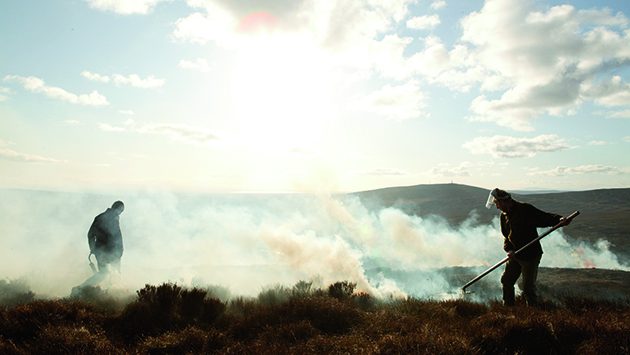The countdown is on for The British Shooting Show – book tickets online today and save on gate price!
Burning helps store carbon according to new study
 heather burning
USD 24 MAR 10 HEATH BURN
Usd 23 oct 13 ring ouzel
Usd 1 oct 14 nws 6
heather burning
USD 24 MAR 10 HEATH BURN
Usd 23 oct 13 ring ouzel
Usd 1 oct 14 nws 6
The claim that controlled burning is harmful and causes damaging releases of carbon dioxide has been increasingly used to criticise traditional upland management in recent years, with a focus on the use of muirburn on grouse moors. However, an authoritative new study has demonstrated that properly used, fire can boost the amount of carbon permanently locked up in soil.
Balance of carbon
The study’s lead author Adam Pellegrini of the University of Cambridge explained that, “Ecosystems can store huge amounts of carbon when the frequency and intensity of fires is just right. It’s all about the balance of carbon going into soils from dead plant biomass, and carbon going out of soils from decomposition, erosion, and leaching.”
In very frequent or very intense fires, which typically take place in dense forests, carbon stored as dead vegetation can be released into the atmosphere as decaying plant matter burns. These fires can also damage carbon rich soils by separating carbon molecules from minerals and killing soil bacteria and fungi. Without fires, soil microbes will break down plant matter and convert it into carbon dioxide or methane.
However, infrequent cool fires help store carbon by creating charcoal and ‘soil aggregates’ which microbes can’t easily break down leading to it being stored in the soil. Fire also promotes the growth of grass roots and it is the roots rather than the leaves of grassy plants which store the most carbon.
Lies
Retired Scottish gamekeeper Ronnie Kippen gave a characteristically blunt analysis of the significance of the study. Ronnie said: “This rather blows a hole in the conservation charities’ lies about controlled muirburn.” Upland farmer Sarah Blackie told Shooting Times: “Farmers and gamekeepers have an instinctive knowledge of the environments that they manage, often what is needed is just for science to catch up with what they already know.”
“In considering how ecosystems should be managed to capture and store carbon from the atmosphere, fire is often seen as a bad thing. We hope this new study will show that when managed properly, fire can also be good – both for maintaining biodiversity and for carbon storage,” said Pellegrini.
Related Articles
Get the latest news delivered direct to your door
Subscribe to Shooting Times & Country
Discover the ultimate companion for field sports enthusiasts with Shooting Times & Country Magazine, the UK’s leading weekly publication that has been at the forefront of shooting culture since 1882. Subscribers gain access to expert tips, comprehensive gear reviews, seasonal advice and a vibrant community of like-minded shooters.
Save on shop price when you subscribe with weekly issues featuring in-depth articles on gundog training, exclusive member offers and access to the digital back issue library. A Shooting Times & Country subscription is more than a magazine, don’t just read about the countryside; immerse yourself in its most authoritative and engaging publication.







